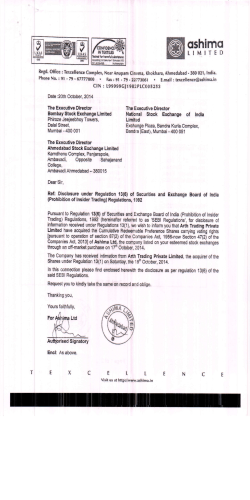
Special points of interest:
OCTOBER 2014 Special points of interest: Chief Minister of Tamil Nadu convi ct ed on charges of corruption and holding disproportionate assets CBI files Charge Sheet in the Aircel-Maxis deal SEBI orders Pearl Group to wind-up its bogus collective investment scheme business CBI registers a case against Electrotherm for criminal conspiracy and cheating Central Bank of India for INR 4.37 billion Arrest of Syndicate Bank’s Chairman on the charges of corruption and bribery Stay on SEBI Order against ex-CEO of Satyam for involvement in corporate fraud and insider trading Serious Fraud Investigation Office submits its probe report in Saradha scam Unit No 5B, Fifth Floor, Hotel J W Marriott, Aerocity, New Delhi—110037, India. Tel: 91-11-41954195 Fax: 91-11-41954196 CONTACT: For additional information, please contact: Srijoy Das, Partner at [email protected] and Anup Kumar, Associate at [email protected] WHITE COLLAR JOURNAL Chief Minister of Tamil Nadu convicted on the charges of corruption and holding disproportionate assets The Chief Minister of Tamil Nadu Ms. Jayalalithaa has been convicted in a case relating to holding assets disproportionate to her sources of income during the period 199196. ‘Disproportionate Assets’ is a term used to describe a situation where an individual's assets, based on his or her source of income, significantly exceeds his/ her total savings after meeting the individual’s total expenditure. Ms. Jayalalithaa has been sentenced to four years imprisonment and fined INR 1 billion (approx. USD 16.67 million) by a Special Court in Bangalore. The Special Judge convicted Jayalalithaa for owning assets amounting to INR 665.5 mil- lion (about USD 11 million), which was disproportionate to her sources of income during 1991-96 when she was the chief minister for the first time. It is alleged that Jayalalithaa abused her position as a Chief Minister of Tamil Nadu from 1991 to 1996 to collect assets that were vastly disproportionate to her income. Owing to her conviction by the Special Court, Jayalalithaa stands disqualified from the post of the Chief Minister and as a member of the legislative assembly of Tamil Nadu. Jayalalithaa is the first Chief Minister of India to have been disqualified to hold her office due to her conviction. She has also been denied bail by relevant court, but is expected to appeal the conviction. CBI files Charge Sheet in the Aircel- Maxis deal Central Bureau of Investigation (“CBI”) has filed a charge sheet in the Aircel-Maxis case. Aircel is an Indian telecom company which was initially owned by an Indian promoter, and Maxis is a Malaysian company owned by a Malaysian promoter. In 2006, Maxis acquired 74% stake in the Aircel and the remaining 26% was acquired by Maxis’ preferred Indian Partner. In April 2011, the promoter of Aircel had filed a complaint with CBI that the then Union Telecom Minister of India had arm twisted him to sell his entire 100% stake in Aircel to Maxis and Maxis’ Indian partner. It has been alleged that the then Union Telecom Minister received a kickback of INR 5.49 billion (approx. USD 91.5 million) for favouring Maxis in various deals relating to the acquisition of Aircel. Allegations are that the kickbacks were not directly paid to the then Union Telecom Minister but was received as an investment in Sun TV Network, which is owned and controlled by the brother of the then Union Minister. It is alleged that Maxis' sister company Astro Astro All Asia Networks Limited (“Astro”) invested INR 6.29 billion (approx. USD 104.83 million) in Sun TV Network to buy 20% of its stake at the price of INR 69.57 (approx. USD 1.15) per share, while the brother of the then Telecom Minister bought the remaining 80% stake at just INR 126 million (approx. USD 2.1 million) at INR 10 (approx. 0.16 USD) per share. It is also alleged that the valuation of Sun TV Network was exorbitantly inflated so that Maxis’ sister company Astro could infuse more capital in the Sun TV Network to cover up for the kickback of INR 5.49 billion (approx. USD 91.5 million). As per the Charge sheet filed, the promoter of Aircel had no desire to sell more than 74 per cent stake. However, Aircel’s promoter was pressurised by the then Union Telecom Minister to exit the telecom business completely by selling 74% stake to Maxis and remaining 26% to Maxis’ preferred Indian partner. OCTOBER 2014 It is alleged that the then Union Telecom Minister had threatened Aircel’s promoter that he would never grant a spectrum licence to Aircel. Preliminary investigation also reveals that soon after the acquisition of Aircel by Maxis, the statutory approvals which had been pending for a long time before the Department of Telecommunications were Copyright © ARCHER & ANGEL, 2014 acceded to and undue favours were given to Aircel. In its charge sheet, the CBI has also raised issues relating to irregularities and violation of foreign exchange laws by Maxis while acquiring Aircel, namely indirect breach of the prescribed foreign ownership cap of 74% in a telecom company. SEBI orders Pearl Group to windup its bogus collective investment scheme business The Indian capital markets regulator Securities and Exchange Board of India (“SEBI”) has ordered Pearls Agrotech Corporation Limited (“Pearl”) to refund INR. 294.2 billion (approx. USD 4.91 billion) raised from some 58.5 million customers through collective investment schemes (“CIS”) in the guise of land allotments. SEBI found Pearl violating CIS regulations by mobilizing money without being registered with the SEBI. CIS is a scheme offered by a company wherein the contributions or payments made by the investors are pooled and utilised with a view to generate profits, income, produce or property for the investors. The CIS is managed by the company offering CIS and the investors do not have day to day control over its management and operation. The Pearl case first came to light in 2002, when SEBI had ruled that the investment schemes offered by Pearl were in the nature of CIS and directed Pearl to abide by the specific regulations governing activities of this nature. The SEBI’s order was quashed in 2003 by the Rajasthan High Court, which was subsequently challenged by SEBI in the Supreme Court of India. In March 2013, the Supreme Court quashing the order of Rajasthan High Court directed SEBI, the Income Tax Department and the Central Bureau of Investigation to investigate the affairs of Pearl. As per the SEBI’s order, Pearl offered two kinds of collective investment schemes—a cash-down payment plan and an instalment payment plan. Under the former scheme, Pearl offered to allot land to customers within 270 days of payment while under the latter within 90 days. SEBI found that the schemes offered by Pearl were not reasonable as Pearl did not have enough land to meet the allotment requirements for customers who were investing money in the company’s two schemes. According to SEBI, the value of Pearl’s land as on March 31, 2014 was INR.117.07 billion (approx. USD 1.951 billion) out of which it had to not only satisfy the claim of 46.3 million customers who have deposited INR.294.2 billion (approx. USD 4.91billion) with it, but also additional 12.2 million customers to whom the land had been allotted but sale deeds had not been executed, thus taking up the total mobilized amount to at least INR.491 billion (approx. USD 8.18 billion). Furthermore, SEBI found that Pearl had raised such huge sums of money through its collective Investment Scheme without securing regulatory approvals as are required as per the provisions of the Securities Exchange Board of India Act, 1992 (SEBI Act) and the Rules framed under the SEBI Act. Thus, SEBI directed the promoters of Pearl to wind up all the existing schemes and refund the money to the investors within three months from the date of order, failing which SEBI will initiate processes for attachment of Pearl’s property and also make a reference to the state governments and local police to register civil and criminal cases against Pearl’s promoters, directors and managers for fraud, cheating, criminal breach of trust and misappropriation of public funds. This matter has also been investigated by the CBI on the direction of the Supreme Court of India. The CBI, Subsequent to its investigation in this case, has registered a case against the promoters of Pearl on the allegations of collection of public deposits under the garb of allotment of farm land to investors by issuing bogus land allotment letters. CBI has also alleged that the funds collected from new investors of Pearl were used to repay the earlier investors to stave off criminal prosecution. Arrest of Syndicate Bank’s Chairman on the charges of corruption and bribery The Central Bureau of Investigation (“CBI”) has arrested Sudhir Kumar Jain, the Chairman and Managing Director of Syndicate Bank and his brother-in-law for allegedly accepting a bribe of INR. 5 million (approx. USD 0.08 million) from the officials of Bhushan Steel Limited (“Bhushan”) It is alleged that Sudhir Kumar Jain abused his position to prevent loans of over INR 1 billion (approx. USD 16.67 million) on Bhushan from being declared as non- performing assets and thus enhanced the credit limit of the Bhushan by bypassing various regulations. Mr. Jain is also alleged to have been involved in accepting bribes for enhancing credit limit of many other companies. CBI has also arrested Neeraj Singal, Vice Chairman and Managing Director of Bhushan for his alleged involvement in the bribery scandal. OCTOBER 2014 Copyright © ARCHER & ANGEL, 2014 CBI registers a case against Electrotherm for criminal conspiracy and cheating Central Bank of India for INR 4.37 billion The Central Bureau of Investigation (“CBI”) has registered a case against Electrotherm (India) Limited (“Electrotherm”) on the basis of a complaint received from Central Bank of India alleging that Electrotherm, its directors and other public servants of Central Bank of India entered into a criminal conspiracy and cheated Central Bank of India to the tune of INR.4.36 billion (approx. USD 72.79 million). It is alleged that Electrotherm had, on the basis of various false representations, requested for a standby letter of credit from Central Bank of India to enable it to supply steel and iron to a company in Tanzania. Subsequent to receipt of credit, Electrotherm did not submit any proof of delivery of the material and defaulted on the loans taken. Since standby Letters of Credit had been opened by Central Bank of India to facilitate this transaction, the bank had to make the payment when Electrotherm failed to pay the counterparty. Standby letter of credit’ is issued by a bank on behalf of its client and is used as a ‘payment of last resort’ should the client fails to fulfil its contractual commitment with a third party. Standby letters of credit are created as a sign of good faith in business transactions, and are proof of a buyer's credit quality and repayment abilities. The investigation by CBI also revealed that the one of the directors of Electrotherm is also the director of the company in Tanzania, which further points towards criminal conspiracy. Stay on SEBI Order against ex-CEO of Satyam and other for their involvement in corporate fraud and insider trading The Securities Appellate Tribunal (“SAT”) has stayed the SEBI order dated July 15, 2014 which imposed a penalty of INR 18.49 billion (approx. USD 308.16 million) along with an interest of 12% from January 7, 2009 up to the date of payment, on the founder-chairman of Satyam Computers Services Limited (“Satyam”) B Ramalinga Raju and four others for their involvement in insider trading and defrauding investors of Satyam in violation of the Securities Exchange Board of India Act, 1992 as well as the Securities Exchange Board of India (Prohibition of Fraudulent and Unfair Trade Practices Relating to the Securities Market) Regulations 2003 and the Securities Exchange Board of India (Prohibition of Insider Trading) Regulations, 1992. However, SAT upheld part of the Order which banned B Ramalinga Raju and four others from accessing the capital markets. SAT has posted the matter for further hearing in December 2014, when it will decide whether to admit the pleas of the Raju and others against the SEBI Order. SAT has also directed SEBI to explain why such a large amount was imposed as part of a disgorgement order. SAT is a statutory body established under the SEBI Act to hear and dispose of appeals against orders passed by the Securities and Exchange Board of India. Person aggrieved against the order of SAT can further appeal in the Supreme Court of India. Serious Fraud Investigation Office submits its probe report in Saradha scam The Serious Fraud Investigation Office (“SFIO”), which has been investigating the alleged INR 870 crore (approx. USD 139.59 million) corporate fraud by Saradha Group of Companies, has in its report concluded that the schemes run by various companies of the group were ponzi schemes, as the primary source of payment to subscribers was not from the income generated from investments but from the collections made from newly enrolled members. SFIO was mandated by the Ministry of Corporate Affairs in April 2013 to probe this scam. The SFIO’s report further concludes that about 14 companies of Saradha Group, including their promoters, directors and managerial personnel have been found to be guilty on many counts for violation of various provisions of the Companies Act, 1956, namely dealing with illegal collection of deposits from public and for defrauding depositors by making false statements regarding activities. SFIO is an organization under the Ministry of Corporate Affairs, consisting of experts from fields of accountancy, forensic auditing, law, information technology, investigation, capital market, taxation, etc. for investigating white collar crimes. The SFIO investigates complex cases of public interest which may involve interdepartmental and multidisciplinary ramifications. The scam came to light early in 2013 when hundreds of thousands of investors in West Bengal and neighbouring states were defrauded through illegal money pooling schemes run by Saradha Group in violation of provisions of the Indian Penal Code, Companies Act, 1956, Securities and Exchange Board of India Act, 1992 and the Prize Chits and Money Circulation Schemes (Banning) Act, 1978. DISCLAIMER: This bulletin is intended as a general overview and discussion of the subjects dealt with. It is not intended, and should not be used, as a substitute for taking legal advice in any specific situation. Archer & Angel will accept no responsibility for any actions taken or not taken on the basis of this publication.
© Copyright 2026













